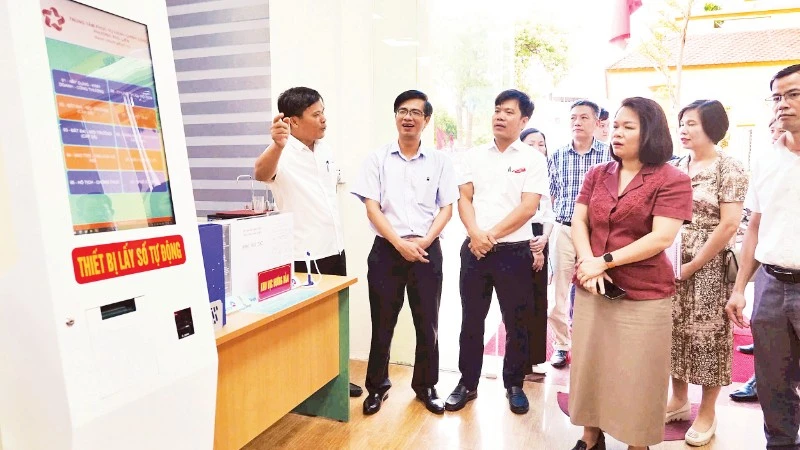During discussions and feedback sessions, many officials and Party members expressed strong agreement with this requirement. From the perspective of local practice, Pham Thi Chuyen, Deputy Secretary of the Hai An Ward Party Committee in Hai Phong, noted that the recent implementation of the two-tier local government model has clearly demonstrated the role of digital transformation in serving the people.
Hai An Ward was established on July 1, 2025 on the basis of the entire natural area and population size of the former wards of Cat Bi, Dang Lam, Thanh To, Dang Hai and Trang Cat, part of the natural area and population of Nam Hai Ward, and part of the natural area of Dong Hai 2 Ward. Hai An Ward covers 39.99 sq km and has a population of 102,648. The ward’s Party organisation currently has 105 Party cells with more than 5,500 members.
As a central ward with a large population and numerous public service units, enterprises and business establishments, demand for administrative procedures and the application of science and technology is substantial.
To better serve residents, the Ward Party Committee has focused on directing efforts to advance science and technology, promote innovation and strengthen digital transformation. The ward People’s Committee has maximised available resources to accelerate digital infrastructure development; worked with relevant agencies to maintain and expand OCOP products on Postmart.vn and Voso.vn; effectively deployed smart tourism applications using QR codes at local historical and cultural sites to serve visitors; and implemented digital platforms for hotel and accommodation management.
The Ward Party Committee has instructed agencies and units to push forward administrative reform and build paperless meetings, digital sessions and e-government. Established and put into operation on July 1, 2025, the Hai An Ward Public Administrative Service Centre processes 100% of administrative dossiers online, consistently achieving an on-time resolution rate of over 98%.
These achievements in science and technology application and digital transformation have made it more convenient for residents and businesses to handle administrative procedures, while improving productivity and business efficiency.
However, in reality, digital transformation infrastructure remains incomplete. The capacity, expertise and digital skills of some officials and civil servants have yet to meet requirements.
To effectively advance digital transformation, Pham Thi Chuyen recommends continued serious implementation of Resolution No. 57-NQ/TW dated 22 December 2024 of the Politburo on breakthroughs in developing science, technology, innovation and national digital transformation. Priority should be given to investment in facilities and equipment to modernise public administration, along with training and upskilling grassroots officials to meet the demands of science, technology and digital transformation.
Nguyen Minh Tuan, a resident of Hai Duong Ward in Hai Phong, said it is essential to fully grasp the guidance of General Secretary To Lam: digital transformation is the “central nervous system,” the vital link connecting provinces and communes in the two-tier local government model. To achieve this, Party committees and authorities must strictly implement the solution highlighted in the draft documents, developing digital citizenship and equipping people with the knowledge and skills necessary to participate effectively in the digital economy and digital society.
It may also be necessary to add tasks focusing on accelerating the development of digital infrastructure and digital data to create a unified foundation from central to local levels; strongly developing high-quality human resources, especially in key technological fields; allocating financial resources efficiently and avoiding fragmented, superficial investment; and strengthening inspection and oversight to ensure that digital transformation is substantive and effective. When the e-government and digital government systems operate seamlessly from the central level down to the grassroots, they will significantly enhance public service delivery.
















